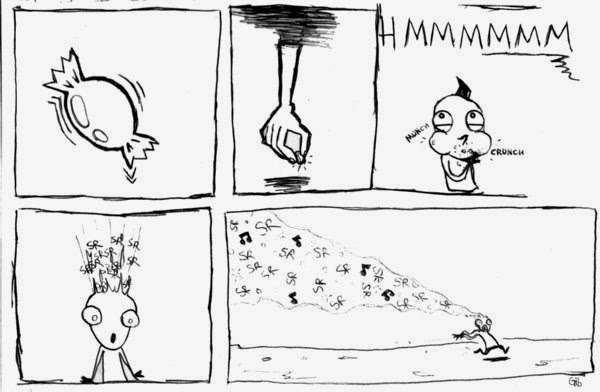All mothers have had one of those nights, i am sure, when the little one refuses to sleep. He wants to talk and play and play some more.. This is absolute fun on a friday or a saturday but from Sunday to Thursday nights, it is well, tiring! .. if only my one year old understood the concept of time and weekends to unleash his wild side.
So last night when my kid went on hyper drive,I played along till my last bit of energy, though continuously thinking what was causing his adrenaline to pump and decided that it was definitely sugar talking. But wait a minute, i didn't give him anything sugar laden to cause this! And then, i remembered co- incidentally, that the kheer and toberlone bits were a night before and he went off to sleep on bang on schedule!
While my son is going beserk at 1 a.m , i am raking my brains on this whole 'sugar rush' concept..is it really true or is it one of those things of the west that we have blindly aped like the cheeseburger?
I couldn't google any established facts, just a few theories and case studies: Below is what Webmd taught me;
So last night when my kid went on hyper drive,I played along till my last bit of energy, though continuously thinking what was causing his adrenaline to pump and decided that it was definitely sugar talking. But wait a minute, i didn't give him anything sugar laden to cause this! And then, i remembered co- incidentally, that the kheer and toberlone bits were a night before and he went off to sleep on bang on schedule!
While my son is going beserk at 1 a.m , i am raking my brains on this whole 'sugar rush' concept..is it really true or is it one of those things of the west that we have blindly aped like the cheeseburger?
I couldn't google any established facts, just a few theories and case studies: Below is what Webmd taught me;
Where Did the Sugar-Hyperactivity Theory Come From?
The notion that food can have an effect on behavior grew popular in 1973
when allergist Benjamin Feingold, M.D., published the Feingold Diet. He
advocated a diet free of salicylates, food colorings and artificial flavoring
for treating hyperactivity. Although Feingold's diet didn't call for
eliminating sugar specifically, it did suggest to many parents that food
additives might be better avoided. Little surprise, then, that refined sugar
soon came under scrutiny.
Then a 1978 study published in the journal Food and Cosmetics
Toxicology found that hyperactive children given glucose tolerance tests
had results that suggested reactive hypoglycemia (low blood sugar). As yet,
though, there are no good theories to explain the connection.
What We Know About Sugar
In the past 10 years, several studies have examined the effects of sugar on
children's behavior. Here are the aspects of the studies that make them
credible:
- Known quantities of sugar in the diets were studied.
- The studies compared the effects of sugar with those of a placebo (a substance without any active ingredients).
- The children, parents and researchers involved in the studies never knew which children were given which diets (this is known as a "double-blind" study and helps to prevent unconscious biases from affecting the results).
An analysis of the results of all these studies was published in the
November 22, 1995 issue of the Journal of the American Medical
Association. The researchers' conclusions? Sugar in the diet did not affect
the children's behavior. The authors did point out, though, that the studies
didn't rule out completely that sugar might be having a slight effect on a
small number of children.
There you go.. it's all a farce..at least from my experience and lack of substantial evidence. Bring out the cake!
My friend at work pointed out today that when i buy a new bag, shoe, dress etc i am so excited sharing pictures with friends, thinking what to wear it with and when.. and literally spend hours and hours talking about it..it's adrenaline and happiness..That's what last night was for him! He was happy being with us and excited to play and didn't want the night to end..I am his new bag or shoe :) It makes me super grateful.. if only i could rationalize it last night than trying to put him to bed, i would have enjoyed it a lot more..hmpf!
Till he prefers to find happiness in materialistic things, i am game for this adrenaline junkie!

No comments:
Post a Comment